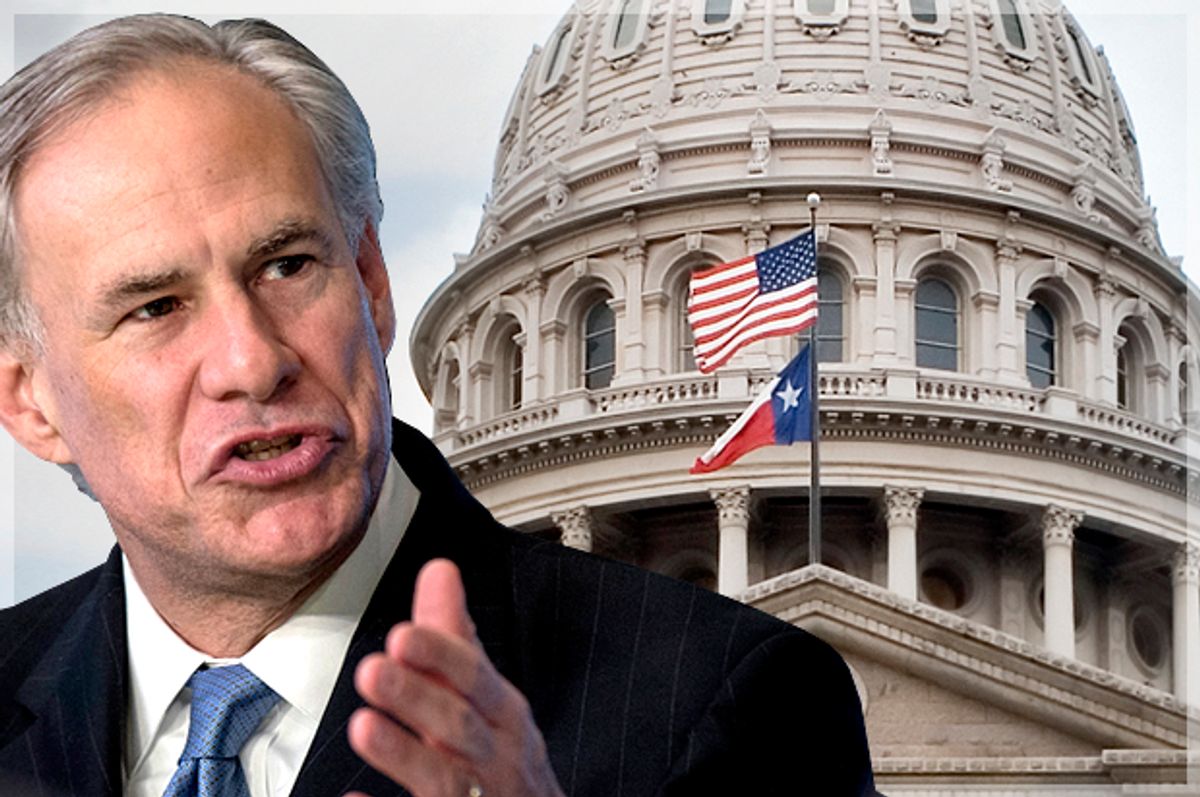"Gov. Greg Abbott issues 8 executive orders aimed at stopping potential mass shooters" was first published by The Texas Tribune, a nonprofit, nonpartisan media organization that informs Texans — and engages with them — about public policy, politics, government and statewide issues.
Gov. Greg Abbott on Thursday issued eight executive orders in response to last month’s mass shootings in El Paso and Odessa.
“Texas must achieve several objectives to better protect our communities and our residents from mass shootings,” Abbott said in a statement. “I will continue to work expeditiously with the legislature on laws to keep guns out of the hands of dangerous criminals, while safeguarding the 2nd Amendment rights of law-abiding Texans.”
The orders focus largely on strengthening law enforcement’s ability to respond and prevent future shootings, largely through improving reporting channels and closing "information gaps" when members of the public or law enforcement agencies worry that a person might be a threat to commit violence. But, Abbott's office added in a news release, "legislative solutions are still needed."
The governor also plans to release a report of recommendations next week from meetings of the Texas Safety Commission, which Abbott formed after the El Paso shooting.
The actions by Abbott come as state lawmakers grapple with how to respond to last month’s tragedies in El Paso, Odessa and Midland. At the beginning of August, a gunman targeting Hispanics in an El Paso Walmart fatally shot 22 people and left more than two dozen injured. Then, over Labor Day weekend, a gunman killed seven people and injured 22 others during a shooting spree in Odessa and Midland.
In the wake of the mass shootings, GOP leaders have assembled task forces and formed select legislative committees to discuss next steps for preventing future massacres. Democrats, meanwhile, have urged Abbott to call a special legislative session to address gun violence.
One of Abbott’s executive orders directs the Texas Department of Public Safety to “develop clear guidance, based on the appropriate legal standard, for when and how Texas law-enforcement agencies should submit Suspicious Activity Reports.” Another order directs the department to work with “local law enforcement, mental-health professionals, school districts, and others to crate multidisciplinary threat assessment teams for each of its regions.”
In both mass shootings, law enforcement had been aware the gunmen prior to their rampages. Weeks before the El Paso shooter opened fire, his mom had called police to express concerns about her son owning a gun, according to news reports. And in West Texas, the shooter there had reportedly called both police and the FBI before the shooting.
Abbott’s eight executive orders:
- Within thirty days of this order, the Texas Department of Public Safety shall develop standardized intake questions that can be used by all Texas law-enforcement agencies to better identify whether a person calling the agency has information that should be reported to the Texas Suspicious Activity Reporting Network.
- Within thirty days of this order, the Department of Public Safety shall develop clear guidance, based on the appropriate legal standard, for when and how Texas law-enforcement agencies should submit Suspicious Activity Reports.
- Within sixty days of this order, the Texas Commission on Law Enforcement shall make training available to educate all law-enforcement officers regarding the standards that will be developed pursuant to Order No. 1 and Order No. 2.
- The Department of Public Safety shall create and conduct an initiative to raise public awareness and understanding of how Suspicious Activity Reports are used by law-enforcement agencies to identify potential mass shooters or terroristic threats, so that the general public and friends, family members, coworkers, neighbors, and classmates will be more likely to report information about potential gunmen.
- The Department of Public Safety shall work with the Texas Education Agency and the Texas Higher Education Coordinating Board on ways to better inform schools, students, staff, and families about the importance of Suspicious Activity Reports and how to initiate that process.
- The Department of Public Safety shall work with local law enforcement, mental-health professionals, school districts, and others to create multidisciplinary threat assessment teams for each of its regions, and when appropriate shall coordinate with federal partners.
- The Department of Public Safety, as well as the Office of the Governor, shall use all available resources to increase staff at all fusion centers in Texas for the purpose of better collecting and responding to Suspicious Activity Reports, and better monitoring and analyzing social media and other online forums, for potential threats.
- Beginning January 1, 2020, all future grant awards from the Office of the Governor to counties shall require a commitment that the county will report at least 90 percent of convictions within seven business days to the Criminal Justice Information System at the Department of Public Safety. By January 1, 2021, such reporting must take place within five business days.
This developing story will be updated soon.
Disclosure: Walmart has been a financial supporter of The Texas Tribune, a nonprofit, nonpartisan news organization that is funded in part by donations from members, foundations and corporate sponsors. Financial supporters play no role in the Tribune's journalism. Find a complete list of them here.
The Texas Tribune is a nonprofit, nonpartisan media organization that informs Texans — and engages with them — about public policy, politics, government and statewide issues.



Shares